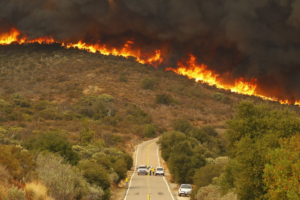At the same time, credit and financial markets have been exposed to even greater risk by governments’ decisions to keep unviable “zombie” companies going during the crisis. Climate change continues to be a massive issue, too, with an urgent need to decarbonize the global economy, especially in the area of urban transport.
Those are just some of the key findings from Swiss Re’s SONAR 2021: New Emerging Risks Insights report released this month.
“When COVID-19 emerged in late 2019, few could have predicted the magnitude of its impact,” said Swiss Re’s group chief risk officer Patrick Raaflaub.
“Many of the actions taken to mitigate the pandemic have themselves created new risks, from the widening inequality gap to the dangers of restarting under-maintained industrial operations. As reinsurers, it is essential that we have the best possible underwriting of these emerging risks. It is also important to remain vigilant on the emerging risks that are already known — especially regarding climate change — as these will impact us for years to come.”
Free Webinar: How to personalise insurance with dynamic policies
- What are some of the considerations and challenges when implementing dynamic policies?
- Are some customisations only possible with human expertise?
- Where are dynamic policies heading next?
1) Income Inequality
The multiple lockdowns across the world have had the unintended consequence of exacerbating the divide between rich and poor.
While many white-collar workers were able to continue working from home, those in the lower-wage, face-to-face service industries such as retail and hospitality suffered high unemployment.
In the U.S. alone, leisure and hospitality unemployment soared to 40% in April 2020 from a base of 5% at the start of last year. That dwarfed the UK, where the unemployment rate for these sectors peaked at 10.9% in the three months leading into January 2021.
What’s more, the number of middle class people globally was 54 million fewer than projected in 2020, according to the Pew Research Center. Of particular concern was the disproportionate effect on younger people struggling with pressured labor markets and a lack of career opportunities, with a 10% unemployment rate for under-25s in the U.S.
This income reduction will have a knock-on effect on insurance demand. It has also highlighted the need for affordable private insurance for middle and lower-income groups.
“The question is how important insurance will be compared to other spending requirements households may have,” said Bernd Wilke, Swiss Re senior manager, group qualitative risk management. “Compared to rent, for example, insurance most likely won’t be important.”
He continued, “The only way to respond to this is for insurance companies to rethink their products. They must be tailored to the needs of less wealthy middle class households in respect to coverage and affordability. If insurance manages to bring such products to the market, they may actually be able to even grow and close the protection gap at the same time, because these products can have a much larger uptake than the current ones.”
2) Rise of the Zombies
Another growing problem is the unsustainable so-called zombie companies propped up by government stimulus measures. These companies are a potential burden to the financial sector, especially in terms of increased credit default rates.
Low interest rates have been incentivizing companies to take up bank credit, creating a risk of large-scale defaults on these loans once government support dries up and these zombie companies become insolvent.
That’s reflected in the take-up of bank loans by small-and-medium enterprises in the U.S., which rose by 6% in 2020, said the Institute of International Finance.
To avoid a surge in defaults and bankruptcies, Swiss Re has advised that governments need to carefully decide how and when to withdraw their support packages. They also need to focus on support businesses that will be viable in the long-run and restructure the non-viable ones, said the reinsurer.
“As we haven’t seen bankruptcies rise during the COVID downturn as in previous recessions, this creates a risk that defaults will rise,” said Wilke.
“Insurers should consider this in risk selection and pricing of credit and surety lines as well as for corporate bonds to be prepared for a sudden risk in bankruptcies in different market. Careful monitoring policy actions by governments, central banks and financial regulators is a must in that context.”
3) Carbon Targets
The report also concluded that rapid decarbonization was key to offsetting the extreme effects of global warming and climate change.
Among the main target areas was transportation, which contributes 24% of global CO2 emissions.
“In the U.S., most cities were built for cars,” said Wilke. “This has the effect that, outside the city centers in the suburbs, longer distances have to be covered to do the shopping and run errands. In such cases, adapting the car to be emission-free and be outfitted with software to avoid accidents is a promising route to take.”
He added, “To get more people to ride public transport and do so more efficiently, city planners will have to integrate technology much more in their thinking. Apps must allow seamless travel with all modes of traffic so the existing space is used as effectively as possible.”
One answer is the move to electromobility, hydrogen fuel cells and non-fossil-based fuel alternatives, which is already well underway and will alleviate traffic-loaded urban centers.
To this end, rental e-scooters have been successfully rolled out across many cities, while self-driving delivery vehicles and clean-powered flying taxis might be possible future solutions, too.
Yet, city planners face the continual challenge of finding ways for new e-vehicles to safely co-exist with traditional transport and infrastructure. And injuries caused by e-scooters and e-bikes are a potential new source of liability claims, while the sharing of personal information within these rental models can also result in data theft, heightening the need for updated legislation and regulation governing them.
“As mobile phones are today a key storage device for data and are often connected to other hard drives and cloud storage, hacking their apps to gain access to them is a possibility,” said Wilke. “Systems that keep the user identity secret can also be compromised.”
As the world emerges post-pandemic, so these risks will become more prevalent. How they are addressed will go a long way towards defining this new world order.
Source: Risk & Insurance








